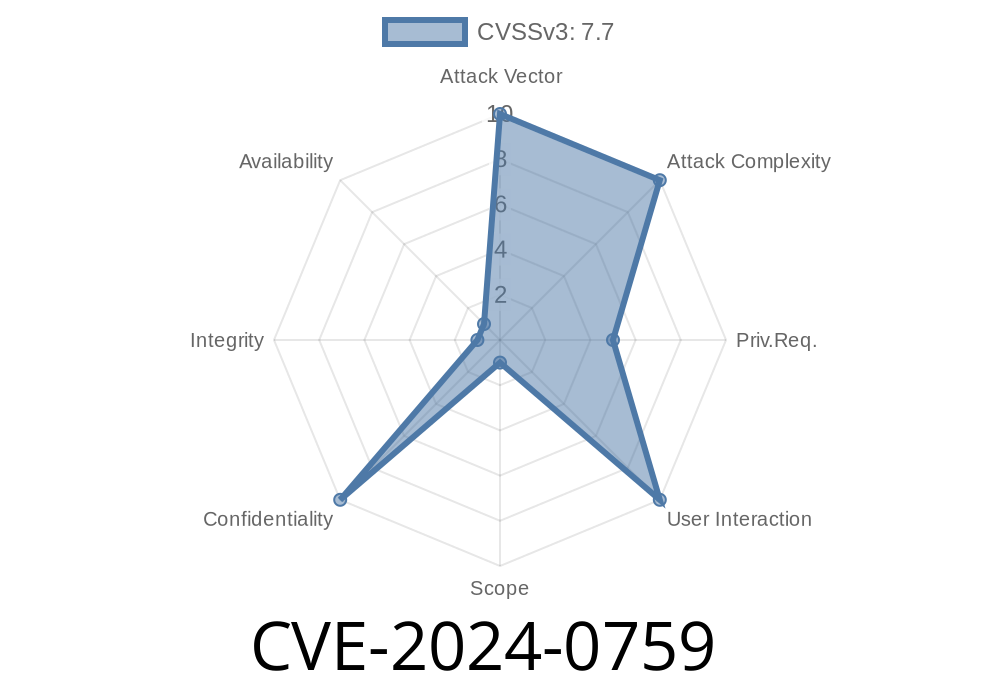*Published: June 2024*
*Author: [your name]*
AnythingLLM is a popular AI knowledge management platform. It lets teams collaborate, chat with documents, and automate research. But earlier this year, a vulnerability tagged CVE-2024-0759 was found that could put your private network in danger—*if you host AnythingLLM inside your own network and give admin-level permissions to the wrong person.*
If you use AnythingLLM, or any web service on your internal network, this is essential reading. I’ll walk you through what happened, why it matters, sample code, and good links to learn more.
🚨 Short version: What is CVE-2024-0759?
If an attacker has *manager* or *admin* access to an AnythingLLM instance, and that instance is running inside your private network, they can use the platform’s link collector to scrape content from internal URLs. That includes web services that are not meant to be exposed—*like dashboards, interal APIs, or even databases with a web UI*.
AnythingLLM must be hosted on an internal network (not just public web).
- The attacker must *guess the internal IP / hostnames and port numbers*.
- The link collector can only request web pages; wildcard scanning is not possible, but guessing common addresses may work.
- Most importantly: The internal web service must not require authentication (i.e., responds to basic curl commands with no headers).
🛠️ How does the exploit work?
AnythingLLM has a “link collector.” It’s meant to collect and embed external information into your knowledge base. But behind the scenes, this lets an admin trigger HTTP GET requests from the AnythingLLM server to *any* address that the server itself can resolve—that includes *private IPs on the same LAN*.
If the user adds a URL in the link collector interface, AnythingLLM will do this (roughly)
// Example: server fetch in Node.js
const fetch = require('node-fetch');
async function grabLinkMetadata(url) {
const res = await fetch(url);
if (!res.ok) throw new Error('Could not collect link');
const text = await res.text();
// ...parse title, description, etc.
return { title, description, url };
}
So if you add e.g. http://192.168.1.50:808, and that is the address of an open internal service, AnythingLLM will connect and aggregate the metadata for you.
> 📌 Note: The AnythingLLM code for link gathering does not let you set custom headers or use wildcards like http://192.168.1.*, but you could brute-force common addresses (like .1.100, .1.101, .1.102, etc.). Still, *no headers* means you can’t bypass web application firewalls or gain access to services that require cookies or JWTs. But many ad-hoc internal web services have no authentication at all.
⚡ Example attack: Lateral Movement
Suppose a company hosts AnythingLLM at 192.168.1.10. There's an internal dashboard for hardware metrics at 192.168.1.120:400—intended only for sysadmins, with *no* authentication.
A malicious manager logs in to AnythingLLM, then asks the link collector to pull http://192.168.1.120:400. If it works, AnythingLLM fetches this content and stores the preview. The attacker now knows:
This is what such a brute-force scan might look like with a simple script
import requests
for last_octet in range(100, 150):
url = f'http://192.168.1.{last_octet}:400';
# Submit this url into AnythingLLM's link collector interface
print(f"Try adding {url} to AnythingLLM link-collector interface.")
# The admin would then look at what domains returned real data and expand.
No automation needed in the core exploit—*the attacker just pastes links into the UI* and sees what AnythingLLM can retrieve.
🤔 Why is this dangerous?
1. Data leakage: Internal docs, admin panels, and configuration pages often have sensitive data—and many of these have no login protection inside company firewalls.
2. Discovery of vulnerabilities: Attackers may use the information gained to exploit other services or move laterally across the network.
3. Trust boundary breach: AnythingLLM becomes a proxy for authenticating ("can this server contact service X") across your infrastructure.
2. Lock down your other internal services
- Never leave internal dashboards/APIs without authentication, even if “only inside the LAN.”
- If possible, use firewalls or reverse proxies to restrict exactly who can access your internal web resources.
### 3. Monitor for odd / unexpected fetches
🔗 References & Further Links
- CVE-2024-0759 on Mitre (official entry)
- AnythingLLM GitHub repository
- Mitigation advice by AnythingLLM (GitHub discussion)
- General internal web security best practices (OWASP)
📝 Conclusion
CVE-2024-0759 is a reminder: when you host internal tools, *even ones you trust*, it’s essential to review who gets admin rights and to keep all other services behind solid authentication and network segmentation. AnythingLLM is not uniquely insecure—this kind of attack is possible in *many* platforms with remote link scraping features.
By limiting permissions, securing your other services, and monitoring what’s happening inside your LAN, you can keep your data safe.
*Stay secure out there!*
*Did you find this helpful? Let me know in the comments, or contribute fixes at the official AnythingLLM repository!*
Timeline
Published on: 02/27/2024 06:15:45 UTC
Last modified on: 03/07/2024 20:15:50 UTC
